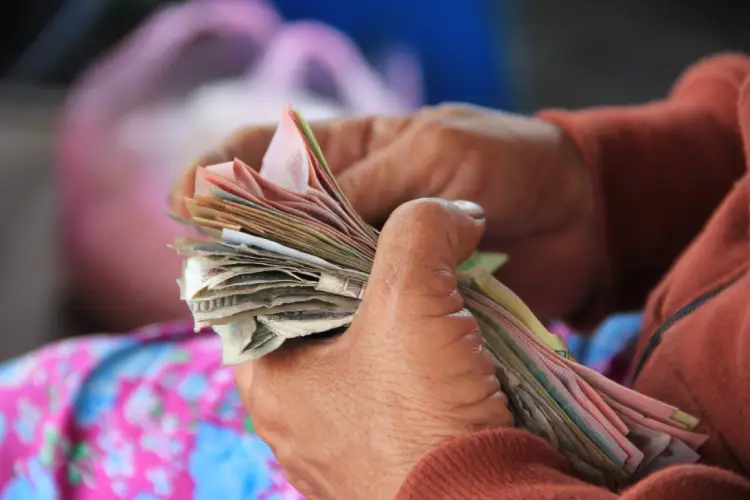
“Bitcoin’s ‘Death Cross’ Looms”. “The Bitcoin Fad is Fading – for Now”.
These are just two of Bloomberg’s five “Most Read” stories this morning. Switch to the Financial Times and Vasant Prabhu, the chief financial officer of Visa – the world’s biggest payment network by market value – is quoted as saying the cryptocurrency is used by “every crook and dirty politician” and speculators who have “no clue”. Ouch.
If Bitcoin has fallen out of favour with mainstream financial pundits – from Allianz Global Investors to Visa’s CFO – the granddaddy of cryptocurrencies is also being abandoned by cyber criminals, who increasingly favour Monero, gaming currencies, and even Paypal to launder up to $200 billion each year in cybercrime profits.

That’s according to a nine-month research project by Surrey University criminology lecturer Mike McGuire, released today. It comes after an earlier study in 2018 by the RAND Corporation estimated that cybercrime has a direct GDP cost of $275 billion to $6.6 trillion globally, and total GDP costs (direct plus systemic) of up to a staggering $22.5 trillion.
The public transparency of bitcoin transactions means that even the use of software “tumbler” services – such as CoinJoin and CoinSwap – which are used to obscure the origins of payments, are little obstacle to determined investigation, Mike McGuire notes, highlighting that researchers have found that it is possible to uniquely identify individuals in up to 60 percent of bitcoin transactions, through browser “leakage”.
Minecraft, FIFA, World of Warcraft…
Your kids might play them. Maybe you do. But the report finds cybercriminals are also spending “considerable time” on games like Minecraft and Grand Theft Auto 5; converting stolen income into video game currency or in-game items like gold, which are then converted into other electronic formats.
“Games such as Minecraft, FIFA, World of Warcraft, Final Fantasy, Star Wars Online and GTA 5 are among the most popular options because they allow covert interactions with other players that allow trade of currency and goods”, it notes.
Dr McGuire added, “Gaming currencies and items that can be easily converted and moved across borders offer an attractive prospect to cybercriminals. This trend appears to be particularly prevalent in countries like South Korea and China – with South Korean police arresting a gang transferring $38 million laundered in Korean games, back to China.”
Security Needs to Change
The research was sponsored by Bromium, a global enterprise security specialist that uses hardware-isolated micro-virtual machines (VMs) to secure user tasks.
“We invested in this research to instigate a meaningful conversation about how to disrupt the economic systems and poor security practices that enable cybercrime around the world; frankly because it’s far too easy for them,” said Gregory Webb, Bromium’s CEO.
“Today it is easy for hackers to infect machines, steal data, and hold businesses and individuals for ransom or sell stolen IP because enterprise defences are not fit for purpose. It is equally easy for them to wash that money and convert it into cash – and the rise in use of unregulated, virtual currencies is making this even easier,” he said.
European Scrutiny
This week the European Union also weighed in, with a new fintech action plan.
The plan hints at tougher regulation of cryptocurrencies down the line: “Crypto-assets and the underlying blockchain technology hold promise for financial markets and infrastructures. Their use also presents risks, as has been witnessed by strong volatility of crypto-assets, fraud and operational weaknesses and vulnerabilities at crypto-asset exchanges,” it notes.

The plan comes after European legislators in December 2017 agreed to extend the scope of the Anti-Money Laundering Directive to virtual currency exchanges and wallet providers.
“In the course of 2018, the Commission will continue monitoring the developments of crypto-assets and Initial Coin Offerings with the ESAs, the European Central Bank and the FSB as well as other international standard setters. Based on the assessment of risks, opportunities and the suitability of the applicable regulatory framework, the Commission will assess whether regulatory action at EU level is required,” the EU concludes.
Mining Bitcoin? No Longer Profitable
Are these the death knells for Bitcoin (which currently trades at essentially the break-even cost of mining one, according to independent research house Fundstrat)?
Silicon Valley-based peer-to-peer payments specialist Abra, who were founded by former Goldman Sachs software engineer Bill Barhydt, are among those focusing on alternative cryptocoin networks. It today announced that it would be launching its newest product on the Litecoin network, rather than Bitcoin.
“Abra has chosen Litecoin as the primary asset class for our investment platform although we now have the ability to move users between Bitcoin and Litecoin contracts. We chose Litecoin after a long and thorough research process to determine the asset class that met our criterion: secure, safe, scalable on-chain and off-chain, low mining fees,” Bill Barhydt said.
With the company’s smartphone app allowing users to invest in 20 cryptocurrencies, there is no shortage of alternatives for those seeking variety.
But to some – cybercriminals, regulators and Visa be damned – Bitcoin is still the only game in town. Fundstrat Managing Partner Thomas Lee said in a note to clients that the big picture still puts bitcoin in a bull phase. (That’s even after a 40% decline from the start of 2018, and a 70% fall from its all-time high in December 2017).
Lee compared the 70% decline to that of mid-2013, a retreat that was followed by a rally of more than 55,000%. It’s a bullish outlook, but his chart puts the price of bitcoin at up to $91,000 by 2020.
That would leave a few CFOs, as well as cybercriminals, weeping.






